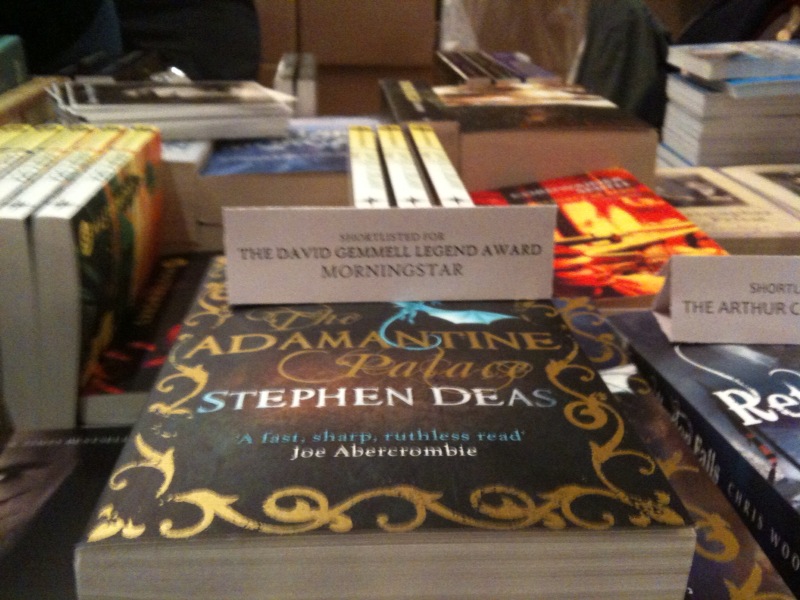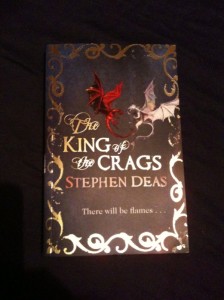It’s the middle of June. Must mean it’s time for the Gemmells and for all its detractors to, well, detract I suppose. It all strikes me as very disingenuous, but I’m sure to those who think the Gemmells are A Bad Thing, there is some sort of deeply important underlying issue at stake, well worth risking the ire of all those who work to make it happen, usually out of their own time and pocket.
Trouble is, three years in, I’m still trying to see what it is. None of you have convinced me that it is A Bad Thing. Flawed, yes, but that fantasy literature would be better off without it? No. What I do think I see, is meanness of spirit and the use of the Gemmells as a pawn in some rather larger and more important debates within the genre. So I challenge you, detractors, to convince me that you’re right, that these awards are, somehow, harmful to our genre, or indeed to anything at all.
No, wait, that’s not going to fly, because then all I’m going to hear are the same things I’ve already heard, and since those arguments haven’t convinced me yet, we’d all be wasting our time. So I’ll trot out the arguments I’ve already heard and tell you why I think they’re either plain wrong or simply irrelevant and disingenuous, and then you can come back to me with how I’ve misunderstood or somehow missed the point, or with some argument that I’ve never heard before. I’m easy to convince of almost anything, provided you can back it up with evidence and don’t talk in absolutes that are easily shown to be false by reductio ad absurdum.
The mission statement for the award is up on their website, as are the criteria for eligibility. “Traditional, Epic, Heroic or High Fantasy and/or in the spirit of David Gemmell.” If you want to argue that this isn’t the same as “rewarding excellence in the field [of the fantasy genre]”, that the scope of the award is too narrow, that by both their choice of scope and the way the winners are chosen by open public vote, the Gemmells reward mainstream commercial fantasy and neither encourage or reward diversity or novelty, go for it. I’ll not disagree. The scope is what it is. It’s narrow. My only question when you’re done will be so what?
So there’s no award for fantasy that doesn’t lie within the scope of the Gemmells. So? The world is full of awards and they all have their own scope, some of them broad, some of them narrow. Does that make them all wrong? Are awards fundamentally bad for having a scope and thus excluding some things from eligibility? Where is the right place to draw a line and say ‘this scope is broad enough and that is not’ and why is your opinion on where that line should be better than mine or those who administer the Gemmells? Criticize the DGLA for their choice of scope if you like – everyone’s entitled to an opinion. Maybe there should be an award for ‘fantasy that doesn’t fall within the scope of the Gemmells.’ Great. I agree. Within reason, I’ll even help.
Criticize the choice of winners if you like. Speech is free, and yes, it’s pretty obvious that if you can gather enough of your friends and fans around you to support you, you can skew the vote, it being a public and open one. So? I don’t hear much criticism of Polish or German or Icelandic or French or Black Library fans for voting for their first choice, and I don’t hear much noise de-crying the apathy of people who didn’t vote. Just the outcome. It’s not perfect. Fair enough. Neither are juries, for that matter (cue endless Booker-Prize-doesn’t-like-genre acrimony).
It is what it is. Criticize it for that by all means. Maybe it could be better. It’s certainly not without its flaws. Complain that it’s not as good as it could be. If the kind of book it seeks to applaud isn’t your cup of tea, you might see very little good in the award. If the money it has raised for charity [1] and the potential for a little social networking between fans and authors and editors[2] leaves you cold, you might see it as having no value whatsoever. A complete irrelevance. I could say that about plenty of things that exist in the world in which I have absolutely no interest whatsoever but which seem to make other people happy, and I’m sure you could too. If it does no harm, so what? Any genre fan who chooses to jump up and shout about something like that would benefit, I suggest, from a little more self-awareness. The world does not revolve around any one of us and what we like. It mostly stopped doing that when we were about five.
That’s if it does no harm. If that’s not true, well then shout and jump and make noises all you like and I’ll shout and jump with you, but so far, I haven’t seen a single convincing argument that says the DGLA is any way bad for anything or anyone.
First complaint: The DGLA encourages mediocrity. Tosh. The Gemmells may by default reward commercial mainstream fantasy of a certain type (and the “of a certain type” is defined by their eligibility criteria). Anyone is entitled to think that commercial mainstream fantasy is all mediocre (“middling or average in quality or performance; rather inferior” – Chambers). That’s a subjective opinion on ‘quality’ and almost by definition incorrect as far as performance goes. In the sum of all opinions, ‘mediocre’ and ‘mainstream’ doubtless overlap to some degree, but neither is a subset of the other. It only takes one person to consider one ‘mainstream’ fantasy book to be of excellent quality for the idea that mainstream = mediocre to be provably false. I don’t need to go very far to find such an example. The idea that the DGLA is somehow in any way responsible for dragging fantasy down towards mediocrity strikes me as ludicrous. How? How does such an award achieve this? Even if you accept the argument (and I don’t, and I cite The Name of the Wind and The Lies of Locke Lamora as counter-examples[3]) that publishers control what is successful, then take issue with that (and I’ll be keeping very quiet and listening very hard at that point). Publishers are fairly conservative and will tend to publish what they think will sell based on what has sold before (sad, but they’re businesses that have to make money to survive). Book-buyers are fairly conservative and will tend to buy what they liked before (sad, but that’s basic human nature). The desire for greater diversity in fantasy, in what fantasy is and what it can do, is laudable, but I don’t see the logical link that goes from that desire to the DGLA being in any way bad. Maybe it does nothing whatsoever to further that desire; well neither do any other literary awards. Neither do grass or trees. That doesn’t make them wrong or bad, it just makes them not relevant to that particular aim.
Note, in passing, that the winners, up until this year’s Way of Kings, were not the great commercial successes of the year in any country. In a way that’s by the by, but note it anyway.
The DGLA encourages mediocrity? Discourages any other kind of fantasy (presumably any kind outside its scope)? Those who think either of those things, I suggest have stepped off the reality train and been seduced onto a branch-line of some other agenda, because really, the Gemmells simply aren’t that significant. As an author, as someone who’s spoken to a lot of other authors, some successful, some still aspiring, the idea that any kind of award has any kind of influence on what we write seems ludicrous. The award that matters most is a contract. Maybe, just maybe, if the DGLA was an award for arthouse books far removed from the mainstream that would struggle to achieve viable sales figures, then you might have an argument to say that whatever its eligibility criteria were, they could influence what authors choose to write. But it isn’t. It rewards the kind of fantasy that already tends to be rewarded by success because it’s the kind of fantasy that sells; in that context, the DGLA and its selection criteria are irrelevant. Yes, a miniature axe and a pat on the back are nice, but besides selling enough copies to make an independent living, irrelevant.
The DGLA is an award for a certain kind of fantasy, and that’s a kind of fantasy that tends to sell well. If you don’t like that kind of fantasy, good for you. If you do, good for you too. I don’t see a shred of evidence to say it has any affect on what gets published and what doesn’t, what gets written and what doesn’t. I challenge its critics again: prove me wrong. Not with unsubstantiated opinions, but with concrete examples. Otherwise, to claim that the DGLA has some bearing on what the fantasy market looks like, that’s just like kicking a well-natured puppy because you don’t like what its master does for a living.
End
[1] In previous years. This year’s auction was to fund the award.
[2] Yes, I’m reaching a bit – but the potential is there.
[3] Very commercially successful debut novels that were certainly not pushed extremely hard on their first release. Pushed a bit, as many debuts are, but not like, say The Passage. And yes, publishers do control what is successful by what they choose to publish; still, they will follow trends in what people choose to buy. Maybe we’d all like them to be more adventurous, and they’d probably like it too, if someone could just show them how to do it without going bust.
![]()

